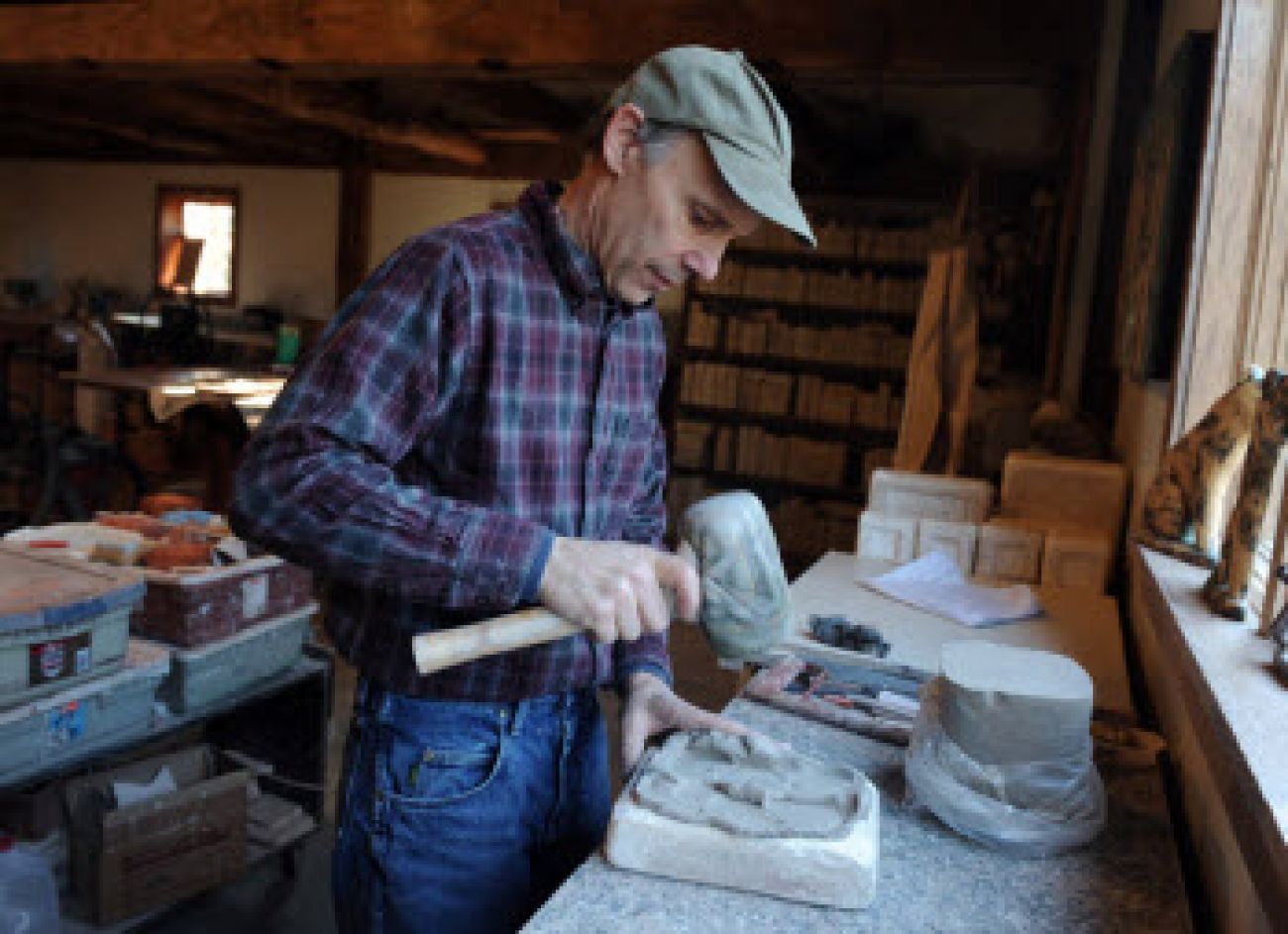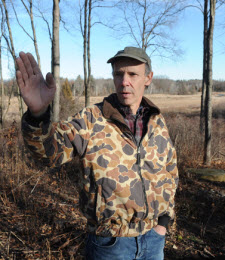Nature-loving tile maker seeks balance between commerce and conservation

HORTON — The plain red exterior of a 19th century red barn that sits near the entry to Scott Weaver’s 80-acre spread south of Jackson reveals nothing about the artwork that takes shape inside the historic structure.
But the old red barn sheds much light on the artist inside, who pounds blocks of clay into exquisite relief tiles that showcase Michigan’s flora and fauna.
Scott Weaver, owner of Weaver Tile, bought the two-story barn from a nearby farmer in 2001, disassembled it and then reconstructed it on his property. The recycled post and beam structure is more than Weaver’s studio — it reflects his commitment to running a small business while protecting the natural environment that informs his work.
“So many businesses seem to be focused only on making money, but we need to think about how our actions affect not just us, but the generations to come,” Weaver said. “We’re all in this together and we’ve got to take care of the environment.”
Weaver’s tiles, which range in size from 2-inch squares to a hanging piece that measures 52-inches wide and 18-inches tall, are hand-pressed in molds he makes himself. He has just one part-time employee to help him churn out the hundreds, sometimes thousands, of tiles he makes each year for kitchens, bathrooms and fireplaces.
A longtime naturalist, Weaver’s passion for nature is evident in his trademark relief tiles. Many feature wildflowers, trees, insects, animals and birds that are set, fittingly, against green backdrops.
“I sculpt whatever is around me,” Weaver said. “I like to sit out in the woods and watch nature; it inspires me.”
His studio and nearby home are perched above a large fen, or wetland, that is part of the headwaters of the Grand River. Liberty Creek bisects the fen and the area teems with wildlife, including an endangered species of butterfly, the Eastern Massasauga rattlesnake, spotted turtle, red fox, coyote, deer and wild turkey.
The Nature Conservancy owns some of the land adjacent to Weaver’s property. He has worked with the organization and government agencies to remove invasive plants from the fen and convert a former cornfield into a native oak savannah on uplands near his studio.
Weaver plans to donate his property to a conservation group to ensure that the fen and oak savannah will be protected in perpetuity. He said large tracts of land must be set aside to allow endangered species to recover.
“The fragmentation of land is one of the big problems you face when you’re trying to preserve endangered species,” he said. “We need big tracts of (undeveloped) land.”
Born to be in the wild
Weaver’s love of nature is rooted in his childhood. He grew up in southern Jackson County and spent much of his spare time fishing in the Grand River and exploring the woods near his home.
“I grew up in the woods and I’ve done a lot of hunting, fishing and looking at crawly things,” the 54-year-old Weaver said. “Because I grew up in the woods, they are near and dear to me.”
By age 10, he was working summers with his father, who was a stonemason.
“I started mixing mud (grout) for my dad when I was 10-years-old,” Weaver said. “I did my first solo job as a stonemason at the Ella Sharp Museum when I was 18.”
His work as a stonemason took him to some of the region’s most luxurious homes. Weaver said he developed a friendship with Bob Lutz, the recently retired General Motors Corp. executive, while doing stonework on Lutz’s home; he said they hunted together for several years.
Weaver was surprised to learn that Lutz, who helped develop the Chevy Volt, made headlines in 2008 when said global warming was a “crock of sh--”
“We’ll have to talk about that the next time he comes out here,” Weaver said.
After 30 years as a stonemason, Weaver’s career took a detour in 1996, when his chiropractor suggested a new line of work that didn’t involve lifting slabs of rock. He took tile-making courses at Pewabic Pottery in Detroit from 1996-1999 and then struck out on his own in 2001.
“I’ve never had an art class in my life,” Weaver said. “I can draw on clay but I can’t draw on paper without a lot of erasing.”
Today, his work is featured in several art galleries around the state. He has sold tiles to customers across the United States and in several foreign countries, including Japan, Switzerland, the Netherlands and Canada.
In February, Weaver will attempt to grow his business by selling tiles to wholesalers. He said selling to wholesalers, instead of working the art fair circuit, would be a more efficient way to sell and distribute tiles.
But Weaver said he doesn’t want his business to get too big. After all, that would reduce the amount of time he spends outdoors, among the plants, animals and insects that stimulate his creativity.
“I don’t need to make vast sums of money to be happy … and I don’t need recognition for my ego,” Weaver said. “I want to make things that people enjoy and find aesthetically pleasing.”
On the Web: www.weavertile.com
Jeff Alexander is owner of J. Alexander Communications LLC and the author of "Pandora's Locks: The Opening of the Great Lakes - St. Lawrence Seaway." He’s a former staff writer for the Muskegon Chronicle.
See what new members are saying about why they donated to Bridge Michigan:
- “In order for this information to be accurate and unbiased it must be underwritten by its readers, not by special interests.” - Larry S.
- “Not many other media sources report on the topics Bridge does.” - Susan B.
- “Your journalism is outstanding and rare these days.” - Mark S.
If you want to ensure the future of nonpartisan, nonprofit Michigan journalism, please become a member today. You, too, will be asked why you donated and maybe we'll feature your quote next time!


 Scott Weaver shows up some of the acreage surrounding Weaver Tile. Weaver has worked the Nature Conservancy to combat invasive species and assist the reclamation of the land by native plants. (Bridge photo/Lon Horwedel)
Scott Weaver shows up some of the acreage surrounding Weaver Tile. Weaver has worked the Nature Conservancy to combat invasive species and assist the reclamation of the land by native plants. (Bridge photo/Lon Horwedel)